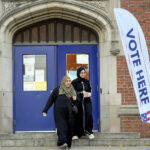(RNS) — Coming out of the subway near New York University on a brisk Friday last week, I spotted women wearing hijabs and men in kufis filing into a nondescript brick and glass building. My plan had been to attend Jummah (Friday) prayers at NYU’s campus Islamic center. Instead I followed the evidently Muslim crowd into the Islamic Center of New York City, a still-developing “independent epicenter for Muslim spiritual, intellectual, professional, and social life in Manhattan,” according to its website.
Shortly afterward, I realized I had stumbled onto a powerful khutba (sermon) given by Imam Khalid Latif, a campus chaplain at NYU and Princeton University and to the New York Police Department.
The next day was the start of early voting in New York, beginning a historic election that would determine whether frontrunner Zohran Mamdani will become the city’s first Muslim mayor, and Latif’s sermon masterfully turned from the power of prayer, to the importance of being unapologetically Muslim, to a plug for voter registration. The imam also called on those gathered to learn from Mamdani’s campaign, which had withstood vitriolic and vile Islamophobic attacks from his opponent former Gov. Andrew Cuomo, Republican U.S. Rep. Elise Stefanik and others in recent weeks.
When Cuomo says anti-Muslim hate rhetoric, it is not just for his voters. It doesn’t embolden them. It is for us as Muslims, to “mess with our psyche,” Latif said.
The same day, outside the Islamic Cultural Center in the Bronx, Mamdani would give an emotional and pivotal speech in which he leaned into his Muslim identity in ways he had avoided doing throughout a campaign focused on economic issues. He gave voice to the difficult experiences of racism, targeted attacks and amplified hate so many Muslim New Yorkers and American Muslims in general have endured for years.
In doing so, he took an extraordinary step in being unapologetically Muslim. “I will be a Muslim man in New York City,” Mamdani said. “I will not change who I am, I will not change how I eat, I will not change the faith that I am proud to belong to. But there is one thing I will change: I will no longer look for myself in the shadows. I will find myself in the light.”
His words come as an open letter, now signed by more than 1,000 rabbis and cantors, called out the “political normalization” of anti-Zionism by political candidates. It comes as numerous articles have explored the complex and challenging struggles Jewish New Yorkers have faced in this election cycle as they grapple with the possibility of their next mayor being a Muslim with particular views on Palestinian rights, genocide and the state of Israel.
What is often overlooked in this anti-Muslim narrative is that, while New York is home to the largest Jewish population outside of Israel, it is also home to the largest Muslim population in the United States. Mamdani’s joy-filled campaign should not be seen as a negation of another group’s place in city politics, but an inflection point for those often-unseen Muslim New Yorkers.
I caught up with Fahd Ahmed, executive director of DRUM Beats, a sibling of the South Asian American political organizing group Desis Rising Up & Moving. Ahmed said that something had changed, as Islamophobic attacks on him escalated.
“We can’t just sidestep (these attacks) and just focus on the broader message. In that moment of Zohran asserting his own Muslim identity and experiences, but again linking it to the experiences of so many Muslim New Yorkers over the last two-and-a-half decades, even now I feel emotional,” said Ahmed.
Even in talking about his Muslim identity, Ahmed pointed out, Mamdani stuck to his message of getting by in New York. “He came back and grounded it into the material experiences of being profiled, of being dismissed, of being disregarded, of being viewed suspiciously. It felt very validating,” Ahmed said.
In acknowledging the hate and racism faced by Muslim New Yorkers and many Muslim Americans — the burden of being asked to prove their Americanness time and time again, in hiding parts of themselves to fit into society, in having their experiences relegated to the background of life — Mamdani made clear that he was looking to the future of the city, its children.
“This isn’t about me,” Mamdani said. “It’s about whether Muslim kids growing up in this city can believe they belong here.”
In mid-October, the Institute for Social Policy and Understanding released its 2025 American Muslim Poll, which measures Islamophobia using the National American Islamophobia Index. The poll disclosed that 63% of Muslims reported facing religious discrimination in the past year, which makes it “more likely than 50 percent of Jews and 22-27 percent of other religious groups” facing similar bias. Forty-seven percent of Muslim families with school-age children reported having a child who faced bullying for their faith in the past year.
Mamdani’s story in New York echoes Virginia legislator Ghazala Hashmi’s historic run for lieutenant governor and Minnesota legislator Omar Fateh’s mayoral race in Minneapolis. In a recent conversation with Hashmi, who is a friend, she asked, “Can you imagine that of all states, Virginia could have a female Muslim lieutenant governor?”
In a time of dismantling of government institutions, non-stop ICE raids, fear and worrying, local leaders are unapologetically being themselves in pursuit of serving their communities. Hashmi ran her first state senatorial campaign in 2019 with the tagline: “Ghazala Hashmi is an American name.” This time around, Virginians no longer need to be told.
Ahmed cautiously views Mamdani’s election and these other campaigns around the country as an inflection point, not only for Muslims but for the promise of a new kind of Democratic Party. He feels hopeful that they will change not only perceptions but policy.
“Having a prominent figure who is willing to speak and act — we see that already with (U.S. Reps.) Rashida Tlaib and Ilhan Omar,” Ahmed said, adding that Mamdani and the others have invested by design in coalition-building. “That is where Zohran and the relationships and coalitions that have been built in (New York) have been more instructive for larger communities,” he said.
As this tumultuous campaign season full of ugly accusations ends, the hope is that one, two or more victories will be an acknowledgment that while one’s identity shouldn’t be the totality of a candidate’s politicking, neither does it need to be hidden to succeed.
(Dilshad D. Ali is a freelance journalist. The views expressed in this commentary do not necessarily reflect those of RNS.)



